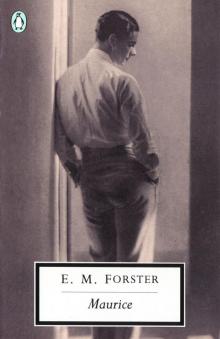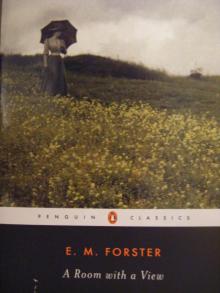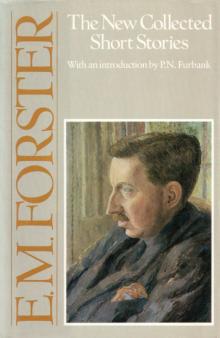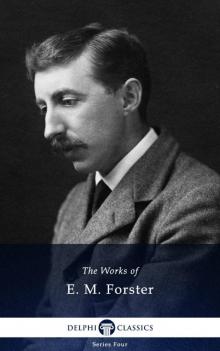- Home
- E. M. Forster
The Longest Journey Page 10
The Longest Journey Read online
Page 10
“I thought that Colonel Robert Ingersoll says you must be strenuous.”
At the sound of this name he whisked open a little cupboard, and declaring, “I haven’t a moment to spare,” took out of it a pile of “Clarion” and other reprints, adorned as to their covers with bald or bearded apostles of humanity. Selecting a bald one, he began at once to read, occasionally exclaiming, “That’s got them,” “That’s knocked Genesis,” with similar ejaculations of an aspiring mind. She glanced at the pile. Renan, minus the style. Darwin, minus the modesty. A comic edition of the book of Job, by “Excelsior,” Pittsburgh, Pa. “The Beginning of Life,” with diagrams. “Angel or Ape?” by Mrs. Julia P. Chunk. She was amused, and wondered idly what was passing within his narrow but not uninteresting brain. Did he suppose that he was going to “find out”? She had tried once herself, but had since subsided into a sprightly orthodoxy. Why didn’t he read poetry, instead of wasting his time between books like these and country like that?
The cloud parted, and the increase of light made her look up. Over the valley she saw a grave sullen down, and on its flanks a little brown smudge—her sheep, together with her shepherd, Fleance Thompson, returned to his duties at last. A trickle of water came through the arbour roof. She shrieked in dismay.
“That’s all right,” said her companion, moving her chair, but still keeping his place in his book.
She dried up the spot on the manuscript. Then she wrote: “Anthony Eustace Failing, the subject of this memoir, was born at Wolverhampton.” But she wrote no more. She was fidgety. Another drop fell from the roof. Likewise an earwig. She wished she had not been so playful in flinging her golosh into the path. The boy who was overthrowing religion breathed somewhat heavily as he did so. Another earwig. She touched the electric bell.
“I’m going in,” she observed. “It’s far too wet.” Again the cloud parted and caused her to add, “Weren’t you rather kind to Flea?” But he was deep in the book. He read like a poor person, with lips apart and a finger that followed the print. At times he scratched his ear, or ran his tongue along a straggling blonde moustache. His face had after all a certain beauty: at all events the colouring was regal—a steady crimson from throat to forehead: the sun and the winds had worked on him daily ever since he was born. “The face of a strong man,” thought the lady. “Let him thank his stars he isn’t a silent strong man, or I’d turn him into the gutter.” Suddenly it struck her that he was like an Irish terrier. He worried infinity as if it was a bone. Gnashing his teeth, he tried to carry the eternal subtleties by violence. As a man he often bored her, for he was always saying and doing the same things. But as a philosopher he really was a joy for ever, an inexhaustible buffoon. Taking up her pen, she began to caricature him. She drew a rabbit-warren where rabbits were at play in four dimensions. Before she had introduced the principal figure, she was interrupted by the footman. He had come up from the house to answer the bell. On seeing her he uttered a respectful cry.
“Madam! Are you here? I am very sorry. I looked for you everywhere. Mr. Elliot and Miss Pembroke arrived nearly an hour ago.”
“Oh dear, oh dear!” exclaimed Mrs. Failing. “Take these papers. Where’s the umbrella? Mr. Stephen will hold it over me. You hurry back and apologize. Are they happy?”
“Miss Pembroke inquired after you, madam.”
“Have they had tea?”
“Yes, madam.”
“Leighton!”
“Yes, sir.”
“I believe you knew she was here all the time. You didn’t want to wet your pretty skin.”
“You must not call me ‘she’ to the servants,” said Mrs. Failing as they walked away, she limping with a stick, he holding a great umbrella over her. “I will not have it.” Then more pleasantly, “And don’t tell him he lies. We all lie. I knew quite well they were coming by the four-six train. I saw it pass.”
“That reminds me. Another child run over at the Roman crossing. Whish—bang—dead.”
“Oh my foot! Oh my foot, my foot!” said Mrs. Failing, and paused to take breath.
“Bad?” he asked callously.
Leighton, with bowed head, passed them with the manuscript and disappeared among the laurels. The twinge of pain, which had been slight, passed away, and they proceeded, descending a green airless corridor which opened into the gravel drive.
“Isn’t it odd,” said Mrs. Failing, “that the Greeks should be enthusiastic about laurels—that Apollo should pursue any one who could possibly turn into such a frightful plant? What do you make of Rickie?”
“Oh, I don’t know.”
“Shall I lend you his story to read?”
He made no reply.
“Don’t you think, Stephen, that a person in your precarious position ought to be civil to my relatives?”
“Sorry, Mrs. Failing. I meant to be civil. I only hadn’t anything to say.”
She laughed. “Are you a dear boy? I sometimes wonder; or are you a brute?”
Again he had nothing to say. Then she laughed more mischievously, and said—
“How can you be either, when you are a philosopher? Would you mind telling me—I am so anxious to learn—what happens to people when they die?”
“Don’t ask me.” He knew by bitter experience that she was making fun of him.
“Oh, but I do ask you. Those paper books of yours are so up-to-date. For instance, what has happened to the child you say was killed on the line?”
The rain increased. The drops pattered hard on the leaves, and outside the corridor men and women were struggling, however stupidly, with the facts of life. Inside it they wrangled. She teased the boy, and laughed at his theories, and proved that no man can be an agnostic who has a sense of humour. Suddenly she stopped, not through any skill of his, but because she had remembered some words of Bacon: “The true atheist is he whose hands are cauterized by holy things.” She thought of her distant youth. The world was not so humorous then, but it had been more important. For a moment she respected her companion, and determined to vex him no more.
They left the shelter of the laurels, crossed the broad drive, and were inside the house at last. She had got quite wet, for the weather would not let her play the simple life with impunity. As for him, he seemed a piece of the wet.
“Look here,” she cried, as he hurried up to his attic, “don’t shave!”
He was delighted with the permission.
“I have an idea that Miss Pembroke is of the type that pretends to be unconventional and really isn’t. I want to see how she takes it. Don’t shave.”
In the drawing-room she could hear the guests conversing in the subdued tones of those who have not been welcomed. Having changed her dress and glanced at the poems of Milton, she went to them, with uplifted hands of apology and horror.
“But I must have tea,” she announced, when they had assured her that they understood. “Otherwise I shall start by being cross. Agnes, stop me. Give me tea.”
Agnes, looking pleased, moved to the table and served her hostess. Rickie followed with a pagoda of sandwiches and little cakes.
“I feel twenty-seven years younger. Rickie, you are so like your father. I feel it is twenty-seven years ago, and that he is bringing your mother to see me for the first time. It is curious—almost terrible—to see history repeating itself.”
The remark was not tactful.
“I remember that visit well,” she continued thoughtfully, “I suppose it was a wonderful visit, though we none of us knew it at the time. We all fell in love with your mother. I wish she would have fallen in love with us. She couldn’t bear me, could she?”
“I never heard her say so, Aunt Emily.”
“No; she wouldn’t. I am sure your father said so, though. My dear boy, don’t look so shocked. Your father and I hated each other. He said so, I said so, I say so; say so too. Then we shall start fair.—Just a cocoanut cake.—Agnes, don’t you agree that it’s always best to speak out?”
“Oh, rather, Mrs.
Failing. But I’m shockingly straightforward.”
“So am I,” said the lady. “I like to get down to the bedrock.—Hullo! Slippers? Slippers in the drawing-room?”
A young man had come in silently. Agnes observed with a feeling of regret that he had not shaved. Rickie, after a moment’s hesitation, remembered who it was, and shook hands with him.
“You’ve grown since I saw you last.”
He showed his teeth amiably.
“How long was that?” asked Mrs. Failing.
“Three years, wasn’t it? Came over from the Ansells—friends.”
“How disgraceful, Rickie! Why don’t you come and see me oftener?”
He could not retort that she never asked him.
“Agnes will make you come. Oh, let me introduce—Mr. Wonham—Miss Pembroke.”
“I am deputy hostess,” said Agnes. “May I give you some tea?”
“Thank you, but I have had a little beer.”
“It is one of the shepherds,” said Mrs. Failing, in low tones. Agnes smiled rather wildly. Mrs. Lewin had warned her that Cadover was an extraordinary place, and that one must never be astonished at anything. A shepherd in the drawing-room! No harm. Still one ought to know whether it was a shepherd or not. At all events he was in gentleman’s clothing. She was anxious not to start with a blunder, and therefore did not talk to the young fellow, but tried to gather what he was from the demeanour of Rickie.
“I am sure, Mrs. Failing, that you need not talk of ‘making’ people come to Cadover. There will be no difficulty, I should say.”
“Thank you, my dear. Do you know who once said those exact words to me?”
“Who?”
“Rickie’s mother.”
“Did she really?”
“My sister-in-law was a dear. You will have heard Rickie’s praises, but now you must hear mine. I never knew a woman who was so unselfish and yet had such capacities for life.”
“Does one generally exclude the other?” asked Rickie.
“Unselfish people, as a rule, are deathly dull. They have no colour. They think of other people because it is easier. They give money because they are too stupid or too idle to spend it properly on themselves. That was the beauty of your mother—she gave away, but she also spent on herself, or tried to.”
The light faded out of the drawing-room, in spite of it being September and only half-past six. From her low chair Agnes could see the trees by the drive, black against a blackening sky. That drive was half a mile long, and she was praising its gravelled surface when Rickie called in a voice of alarm, “I say, when did our train arrive?”
“Four-six.”
“I said so.”
“It arrived at four-six on the time-table,” said Mr. Wonham. “I want to know when it got to the station?”
“I tell you again it was punctual. I tell you I looked at my watch. I can do no more.”
Agnes was amazed. Was Rickie mad? A minute ago and they were boring each other over dogs. What had happened?
“Now, now! Quarrelling already?” asked Mrs. Failing. The footman, bringing a lamp, lit up two angry faces.
“He says—–”
“He says—–”
“He says we ran over a child.”
“So you did. You ran over a child in the village at four-seven by my watch. Your train was late. You couldn’t have got to the station till four-ten.”
“I don’t believe it. We had passed the village by four-seven. Agnes, hadn’t we passed the village? It must have been an express that ran over the child.”
“Now is it likely”—he appealed to the practical world—“is it likely that the company would run a stopping train and then an express three minutes after it?”
“A child—–” said Rickie. “I can’t believe that the train killed a child.” He thought of their journey. They were alone in the carriage. As the train slackened speed he had caught her for a moment in his arms. The rain beat on the windows, but they were in heaven.
“You’ve got to believe it,” said the other, and proceeded to “rub it in.” His healthy, irritable face drew close to Rickie’s. “Two children were kicking and screaming on the Roman crossing. Your train, being late, came down on them. One of them was pulled off the line, but the other was caught. How will you get out of that?”
“And how will you get out of it?” cried Mrs. Failing, turning the tables on him. “Where’s the child now? What has happened to its soul? You must know, Agnes, that this young gentleman is a philosopher.”
“Oh, drop all that,” said Mr. Wonham, suddenly collapsing.
“Drop it? Where? On my nice carpet?”
“I hate philosophy,” remarked Agnes, trying to turn the subject, for she saw that it made Rickie unhappy.
“So do I. But I daren’t say so before Stephen. He despises us women.”
“No, I don’t,” said the victim, swaying to and fro on the window-sill, whither he had retreated.
“Yes, he does. He won’t even trouble to answer us. Stephen! Podge! Answer me. What has happened to the child’s soul?”
He flung open the window and leant from them into the dusk. They heard him mutter something about a bridge.
“What did I tell you? He won’t answer my question.”
The delightful moment was approaching when the boy would lose his temper: she knew it by a certain tremor in his heels.
“There wants a bridge,” he exploded. “A bridge instead of all this rotten talk and the level-crossing. It wouldn’t break you to build a two-arch bridge. Then the child’s soul, as you call it—well, nothing would have happened to the child at all.”
A gust of night air entered, accompanied by rain. The flowers in the vases rustled, and the flame of the lamp shot up and smoked the glass. Slightly irritated, she ordered him to close the window.
11
Cadover was not a large house. But it is the largest house with which this story has dealings, and must always be thought of with respect. It was built about the year 1800, and favoured the architecture of ancient Rome—chiefly by means of five lank pilasters, which stretched from the top of it to the bottom. Between the pilasters was the glass front door, to the right of them the drawing-room windows, to the left of them the windows of the dining-room, above them a triangular area, which the better-class servants knew as a “pendiment,” and which had in its middle a small round hole, according to the usage of Palladio. The classical note was also sustained by eight grey steps which led from the building down into the drive, and by an attempt at a formal garden on the adjoining lawn. The lawn ended in a Ha-ha (“Ha! ha! who shall regard it?”), and thence the bare land sloped down into the village. The main garden (walled) was to the left as one faced the house, while to the right was that laurel avenue, leading up to Mrs. Failing’s arbour.
It was a comfortable but not very attractive place, and, to a certain type of mind, its situation was not attractive either. From the distance it showed as a grey box, huddled against evergreens. There was no mystery about it. You saw it for miles. Its hill had none of the beetling romance of Devonshire, none of the subtle contours that prelude a cottage in Kent, but proffered its burden crudely, on a huge bare palm. “There’s Cadover,” visitors would say. “How small it still looks. We shall be late for lunch.” And the view from the windows, though extensive, would not have been accepted by the Royal Academy. A valley, containing a stream, a road, a railway; over the valley fields of barley and wurzel, divided by no pretty hedges, and passing into a great and formless down—this was the outlook, desolate at all times, and almost terrifying beneath a cloudy sky. The down was called “Cadbury Range” (“Cocoa Squares” if you were young and funny), because high upon it—one cannot say “on the top,” there being scarcely any tops in Wiltshire—because high upon it there stood a double circle of entrenchments. A bank of grass enclosed a ring of turnips, which enclosed a second bank of grass, which enclosed more turnips, and in the middle of the pattern grew one small tree. British? Roma
n? Saxon? Danish? The competent reader will decide. The Thompson family knew it to be far older than the Franco-German war. It was the property of Government. It was full of gold and dead soldiers who had fought with the soldiers on Castle Rings and been beaten. The road to Londinium, having forded the stream and crossed the valley road and the railway, passed up by these entrenchments. The road to London lay half a mile to the right of them.
To complete this survey one must mention the church and the farm, both of which lay over the stream, in Cadford. Between them they ruled the village, one claiming the souls of the labourers, the other their bodies. If a man desired other religion or other employment he must leave. The church lay up by the railway, the farm was down by the water meadows. The vicar, a gentle charitable man, scarcely realized his power, and never tried to abuse it. Mr. Wilbraham, the agent, was of another mould. He knew his place, and kept others to theirs: all society seemed spread before him like a map. The line between the county and the local, the line between the labourer and the artisan—he knew them all, and strengthened them with no uncertain touch. Everything with him was graduated—carefully graduated civility towards his superior, towards his inferiors carefully graduated incivility. So—for he was a thoughtful person—so alone, declared he, could things be kept together.
Perhaps the Comic Muse, to whom so much is now attributed, had caused his estate to be left to Mr. Failing. Mr. Failing was the author of some brilliant books on socialism,—that was why his wife married him—and for twenty-five years he reigned up at Cadover and tried to put his theories into practice. He believed that things could be kept together by accenting the similarities, not the differences of men. “We are all much more alike than we confess,” was one of his favourite speeches. As a speech it sounded very well, and his wife had applauded; but when it resulted in hard work, evenings in the reading-rooms, mixed-parties, and long unobtrusive talks with dull people, she got bored. In her piquant way she declared that she was not going to love her husband, and succeeded. He took it quietly, but his brilliancy decreased. His health grew worse, and he knew that when he died there was no one to carry on his work. He felt, besides, that he had done very little. Toil as he would, he had not a practical mind, and could never dispense with Mr. Wilbraham. For all his tact, he would often stretch out the hand of brotherhood too soon, or withhold it when it would have been accepted. Most people misunderstood him, or only understood him when he was dead. In after years his reign became a golden age; but he counted a few disciples in his lifetime, a few young labourers and tenant farmers, who swore tempestuously that he was not really a fool. This, he told himself, was as much as he deserved.

 The Celestial Omnibus and Other Stories
The Celestial Omnibus and Other Stories Maurice
Maurice The Longest Journey
The Longest Journey Howards End
Howards End A Room with a View
A Room with a View The New Collected Short Stories
The New Collected Short Stories A Passage to India
A Passage to India Where Angels Fear to Tread
Where Angels Fear to Tread Works of E M Forster
Works of E M Forster Selected Stories
Selected Stories The Machine Stops
The Machine Stops Aspects of the Novel
Aspects of the Novel